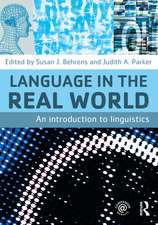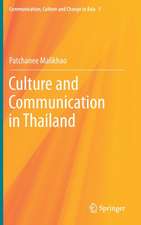Intercultural Communication: Critical Approaches and Future Challenges
Autor Giuliana Ferrien Limba Engleză Hardback – 20 feb 2018
Drawing on interdisciplinary theoretical perspectives, this book critically examines intercultural theory and its interrelations with globalisation, education and dialogue in multicultural societies. Applying the ethics of Emmanuel Levinas, the author repositions intercultural communication within a new paradigm that challenges static interpretations of self and other, and suggests future directions for the development of a post-methodological framework based on the decentring of the researcher. This innovative work will provide researchers and language teachers with the critical tools needed to challenge instrumentalist approaches to communication in a diverse global context, characterised by conflict and fear of the other and fresh insights to scholars of education, applied linguistics and sociology.
Preț: 482.94 lei
Nou
Puncte Express: 724
Preț estimativ în valută:
92.41€ • 96.49$ • 76.31£
92.41€ • 96.49$ • 76.31£
Carte tipărită la comandă
Livrare economică 15-29 aprilie
Preluare comenzi: 021 569.72.76
Specificații
ISBN-13: 9783319739175
ISBN-10: 3319739174
Pagini: 141
Ilustrații: IX, 117 p. 9 illus., 2 illus. in color.
Dimensiuni: 148 x 210 x 3 mm
Greutate: 0.3 kg
Ediția:1st ed. 2018
Editura: Springer International Publishing
Colecția Palgrave Macmillan
Locul publicării:Cham, Switzerland
ISBN-10: 3319739174
Pagini: 141
Ilustrații: IX, 117 p. 9 illus., 2 illus. in color.
Dimensiuni: 148 x 210 x 3 mm
Greutate: 0.3 kg
Ediția:1st ed. 2018
Editura: Springer International Publishing
Colecția Palgrave Macmillan
Locul publicării:Cham, Switzerland
Cuprins
Chapter 1: Introduction.- Chapter 2: A Critical Framework for Intercultural Communication.- Chapter 3: The ethics of interculturalism.- Chapter 4: Dwelling or sojourning? Modalities of interculturality.- Chapter 5: Conclusion.
Recenzii
“It is undoubtedly an important and practical book for educators and language teachers to help learners effectively develop intercultural competence. … this book provides researchers and language teachers with the critical tools needed to challenge instrumentalist approaches to communication in a diverse global context, characterized by conflict and fear of the other and fresh insights to scholars of education, applied linguistics, and sociology.” (Weiping Wu and Ting Li, International Journal of Communication, Vol. 14, 2020)
Notă biografică
Giuliana Ferri is a Senior Lecturer in Early Years Education and Education Studies in the School of Human and Social Sciences at the University of West London, UK. Her research focuses on language in education and education policy, intercultural ethics and human rights.
Textul de pe ultima copertă
‘By eschewing a classic empirical intercultural education model and insisting on an in-depth philosophical reading of key thinkers in the field we have, at long last, the beginnings of a philosophy of intercultural Communication. This is a work of considerable importance.’
—Alison Phipps, OBE, UNESCO Chair in Refugee Integration through Languages and the Arts, University of Glasgow, UK
‘With this book, Giuliana Ferri does the field a great service and provides us with an intercultural philosophy for our times.’
—John O’Regan, University College London, UK‘A refreshing, bold and deeply intellectual contribution to the ongoing debate about interculturality in language learning.’
—Gerdi Quist, University College London, UK
Drawing on interdisciplinary theoretical perspectives, this book critically examines intercultural theory and its interrelations with globalisation,education and dialogue in multicultural societies. Applying the ethics of Emmanuel Levinas, the author repositions intercultural communication within a new paradigm that challenges static interpretations of self and other, and suggests future directions for the development of a post-methodological framework based on the decentring of the researcher. This innovative work will provide researchers and language teachers with the critical tools needed to challenge instrumentalist approaches to communication in a diverse global context, characterised by conflict and fear of the other and fresh insights to scholars of education, applied linguistics and sociology.
Giuliana Ferri is a Senior Lecturer in Early Years Education and Education Studies at the University of West London, UK.
Caracteristici
Presents a philosophical approach to intercultural communication that addresses key issues in the field, including essentialism and a belief in the measurability of intercultural competence Proposes an alternative conceptualisation of the intercultural, based on the ethics of Levinas Critiques the idea of intercultural dialogue as an unproblematised construct Addresses the wider implications of intercultural communication in the context of widening gaps between self/other along axis of citizenship, inequality and cultural hegemony






















